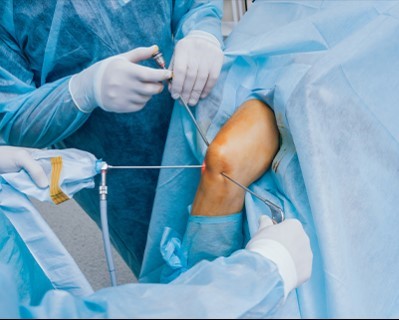Arthroscopic Knee Surgery
- Purpose: Diagnoses and treats problems inside the knee joint using minimally invasive techniques.
- Procedure: Small incisions are made, and an arthroscope is used to visualize and treat the joint.
-
Note: The information provided here applies to routine Arthroscopic Knee Surgery under typical conditions. However, the specifics may vary based on individual factors, such as the extent of knee damage, the patient’s overall health, and any complications that might arise during or after the procedure. The complexity of the surgery and the patient’s unique circumstances will also influence the recovery process.
Inpatient/Outpatient
Arthroscopic knee surgery is usually performed as an outpatient procedure, allowing most patients to go home the same day after a brief recovery period.Hospital Stay Duration
Patients undergoing arthroscopic knee surgery typically do not require an overnight hospital stay. They are generally discharged a few hours after the procedure, once they are stable and comfortable.Type of Anesthesia
Arthroscopic knee surgery is commonly performed under regional anesthesia, such as spinal or epidural anesthesia, which numbs the lower body while the patient remains awake but sedated. In some cases, general anesthesia may be used, depending on the patient’s preference and the surgeon’s recommendation.Travel After Procedure
Patients are generally advised to avoid travel, especially long-distance or air travel, for at least 1 to 2 weeks after the procedure. This allows time for initial recovery and monitoring for potential complications, such as swelling or joint stiffness.Pre-procedure Preparation
Preparation for arthroscopic knee surgery involves following specific guidelines provided by the healthcare team. This may include fasting before the procedure, stopping certain medications, and undergoing pre-operative tests such as blood work or imaging studies. Patients should also arrange for someone to drive them home after surgery.Procedure Duration
The arthroscopic knee surgery procedure typically lasts about 30 minutes to 1 hour, depending on the complexity of the condition being treated. During the procedure, the surgeon inserts a small camera (arthroscope) into the knee joint through small incisions. This allows the surgeon to view and treat issues such as torn cartilage, damaged ligaments, or loose fragments of bone or cartilage.Recovery Time
Recovery from arthroscopic knee surgery is usually quicker than from open surgery. Most patients can begin light activities within a few days and return to normal activities within 2 to 6 weeks, depending on the extent of the surgery. Physical therapy is often recommended to restore strength, flexibility, and range of motion in the knee. Patients should follow their healthcare provider’s instructions on activity restrictions and exercises to ensure a smooth recovery.Estimated Cost
The cost of arthroscopic knee surgery can vary depending on factors such as the surgeon's expertise, the complexity of the procedure, and geographic location. For accurate cost information, patients should consult their healthcare provider or surgical center directly.Post-procedure Care
Post-operative care for arthroscopic knee surgery involves managing pain, preventing infection, and ensuring proper healing. Patients may be prescribed pain relievers and advised to use ice packs and elevate the knee to reduce swelling. Follow-up appointments are important to monitor recovery and assess the need for further treatment or physical therapy. It is important to report any signs of complications, such as persistent pain, increased swelling, or redness, to the healthcare provider promptly.

